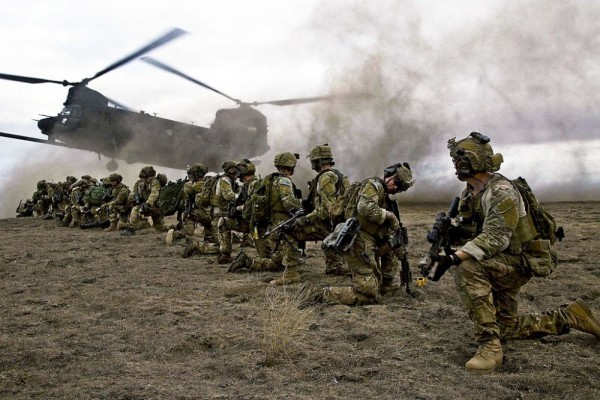Noam Chomsky warns of ‘very dangerous’ US antagonism of China
“Biden has pretty much picked up Trump’s foreign policy”

Appearing on Democracy Now! last week, Noam Chomsky accused US President Joe Biden of continuing a perilous policy of confrontation with China. Photo by Tomas Roggero/Flickr.
Linguist and dissident Noam Chomsky this week condemned the Biden administration’s aggressive anti-China foreign policy, while dismissing the imperialist notion that Beijing poses a threat to the United States and urging a departure from the “provocation” that for decades has characterized the US stance toward the rising giant.
Appearing on Democracy Now! last week, Chomsky—a renowned critic of American militarism—accused President Joe Biden of continuing a perilous policy of confrontation with China.
While acknowledging that Biden “has eliminated some of the more gratuitously savage elements” of former President Donald Trump’s policies—including suspending US funding for the United Nations Relief and Works Agency for Palestine Refugees (UNRWA)—Chomsky contended that “the trajectory is not optimistic.”
“Biden has pretty much picked up Trump’s foreign policy,” he asserted. “The worst case is the increasing provocative actions towards China. That is very dangerous.”
Renowned author and political dissident Noam Chomsky slams President Biden’s foreign policy, particularly its aggressions toward China: “The U.S. will not tolerate the existence of a state that cannot be intimidated.” pic.twitter.com/cpopg04D16
— Democracy Now! (@democracynow) November 23, 2021
Chomsky continued:
By now there is constant talk about what is called the China threat. You can read it in sober, reasonable, usually reasonable journals, about the terrible China threat, and that we have to move expeditiously to contain and limit the China threat.
What exactly is the China threat? Actually that question is rarely raised here. It is discussed in Australia, the country that is right in the claws of the dragon. Recently the distinguished statesman, former Prime Minister Paul Keating, did have an essay in the Australian press about the China threat. He finally concluded realistically that the China threat is China’s existence.
Speaking at the National Press Club of Australia earlier this month, Keating—who served as prime minister representing the center-left Labour Party from 1991 to 1996—accused his country’s right-wing government of acting against its own interests by supporting the United States as it engages in what anti-imperialists have called “saber-rattling” over Taiwan.
Paul Keating makes it clear up front in his address to the National Press Club that talk in some sections of the media of Australia going to war with #China is idiotic.
— Mark (@mark_melbin) November 11, 2021
Enter Andrew Greene, the ABC's warmongering #defence correspondent.#Taiwan #NPC #ThisIsNotJournalism #auspol pic.twitter.com/HoUvR1OqfJ
“Taiwan is not a vital Australian interest,” Keating insisted in his controversial speech. “We have no alliance with Taipei.”
“We are committed to ANZUS for an attack on US forces, but… not an attack by US forces, which means Australia should not be drawn, in my view, into a military engagement over Taiwan,” he added, referring to the Australia, New Zealand, United States Security Treaty.
That Cold War-era pact is now 60 years old. More recently, the US and some of its close allies have antagonized Beijing by signing the anti-China Australia-United Kingdom-United States (AUKUS) military agreement. The US, Australia, India, and Japan have also launched the Quadrilateral Security Dialog to address concerns about China.
Chomsky said US antagonism toward China is motivated by the fact that the burgeoning superpower cannot be controlled by Washington.
“The US will not tolerate the existence of a state that cannot be intimidated the way Europe can be, that does not follow US orders the way Europe does but pursues its own course,” he said. “That is the threat.”
While acknowledging the “terrible things” the Chinese government does within its own borders, Chomsky insisted that “they are not a threat.”
Turning the rhetorical tables, he asked: “Is the US support for Israel’s terrorist war against two million people in Gaza where children are being poisoned—a million children are facing poisoning because there’s no drinkable water, is that a threat to China?”
“It is a horrible crime,” he said, “but it is not a threat to China.”
Critics of US foreign policy have noted that while China has not started a war in over a generation, the United States has invaded, bombed, or occupied over a dozen nations since the 1980s.
The demand for Peace is a subversive demand when US is playing only card it believes it has - militarism - in order to maintain global dominance. Opposing US warmongering & insane policies of escalating tensions with China has to be #1 priority for peace movement.
— Ajamu Baraka (@ajamubaraka) September 24, 2021
Chomsky called the imbalance in military power between the United States—which has thousands of nuclear weapons and spends more money on its war machine than the next 10 nations combined—and China “laughable.”
“One US submarine can destroy almost 200 cities anywhere in the world with its nuclear weapons,” he noted. “China in the South China Sea has four old noisy submarines which can’t even get out because they’re contained by superior US and allied force.”
Brett Wilkins is staff writer for Common Dreams.
This article originally appeared on CommonDreams.org.










